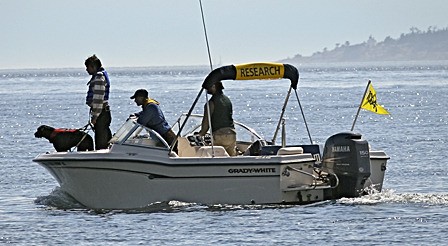We all can picture tracker dogs saving earthquake victims in Haiti, but saving killer whales? Get real!
On Tuesday, Feb. 9 at 7 p.m., Katherine Ayres, a Ph.D. Candidate at the University of Washington’s Center for Conservation Biology, will explain how and why she is using tracker dogs to save endangered southern resident killer whales.
Ayres uses whale scat to measure the health of individual whales and to ultimately assess the health of the overall population. But finding whale poop in the wild is not easy. That’s where a trained scat detection dog can be a big help. Just like tracker dogs that can be trained to detect live people under rubble or cocaine packed inside of a can of gasoline, they too can be trained to detect killer whale feces floating on the water at great distances. Ayers will talk about how detection dogs are being used and what valuable information can be gained from the scat, which unlike blubber biopsies, is collected without impacting already endangered animals.
The 2009/10 Marine Science Lecture Series was created to highlight the amazing fish and wildlife of our region and to inspire the public. Lectures are free and are at the Camp Orkila Marine Salmon Center. Park in the upper parking lot at Camp Orkila. Shuttle service from the parking lot to the talk is available before and after the lecture.




